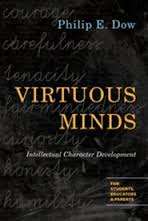Summer is over when faculty meetings begin! Today my division held our yearly colloquium, and with that (regardless of what the calendar says)  my summer ended. Don’t get me wrong, our meeting is always an excellent time for reconnecting and learning from each other. I heard papers on a delightfully diverse range of topics: Open Theism, Karl Barth’s aesthetics, Paul’s journey’s in Asia, “blindness” in the Gospel of Mark, ministerial support strategies, and a tantalizing preview of Tom Bergler’s new book.
my summer ended. Don’t get me wrong, our meeting is always an excellent time for reconnecting and learning from each other. I heard papers on a delightfully diverse range of topics: Open Theism, Karl Barth’s aesthetics, Paul’s journey’s in Asia, “blindness” in the Gospel of Mark, ministerial support strategies, and a tantalizing preview of Tom Bergler’s new book.
The subject for the morning discussion was Philip Dow’s Virtuous Minds. Released by IVPAcademic earlier this summer, it hits its target audience of parents, high school students, and educators dead on. Specifically parents and teachers of high school students (and those students themselves) will find much for them here. College educators will want more detail and depth, fair enough. But they (we) are not his intended audience. That being said, Dow’s book provoked a vigorous and lively discussion about intellectual virtue at Huntington University. I also think every one of our freshman should read this book.
From my experience, intellectual tenacity and courage are the two virtues most embattled in our educational system in America. Dow’s concise definitions for both don’t say everything that needs to be said, but they at least get the conversation started: Intellectual tenacity – Those who are intellectually tenacious earnestly want to know the truth, so they are not willing to give up when they find an assignment difficult or boring. They are determined to fight through the difficulty in order to gain a deeper understanding of the material.
Intellectual courage – Those who are intellectually courageous earnestly want to know the truth, so they take risks in the pursuit of truth. They are willing to reconsider their own beliefs, even if this scares them. But once they have done so, and come to a belief about what is true, they are willing to stick to their guns, even if the majority mocks or threatens them. The intellectually courageous student is willing to take risks in class assignments in the pursuit of excellence and truth.
I am curious. How much has your education focused on intellectual virtues? If so, how?

If you don’t mind me asking, who is working on Barth’s aesthetics?
Sure, Bo Helmich. If you are interested in having a conversation I am sure he would be thrilled. You can access his contact details on the Huntington University website.
Thanks, Kent. I’ll keep him in mind. I have had an enduring interest in Barth’s possible reply to Balthasar’s Seeing the Form, which I first read at Aberdeen with Francesca (and Graham, Ken, David, Scott, and a couple others).
I think I may have attended the first couple meetings of that seminar. I wish now I would have stayed around, but I don’t remember all the reasons for dropping out. The pressure to finish the thesis was often overwhelmingly intense. I recently heard someone say, “I don’t have writer’s block, I have a mortgage.” That described me pretty well in Aberdeen!
Ha, I completely understand. It was a great seminar though. You’ll have to do a reading group on Balthasar at Huntington!
That would be so good! My first year I did a “theology club” of sorts and this turned into an unofficial spring semester senior seminar. We read texts, discuss, student’s make presentations, etc. Its a grand time (!), but it requires a big time commitment as well…tough to make these days with class loads, writing, publication deadlines, young kids at home…I hope I can pull it off again this year.
Many blessings on your studies!